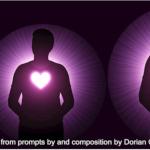Left Behind, pg. 275
Rayford and Chloe Steele have just finished watching Nightline. This is noteworthy since we're well enough acquainted with the Steele's daily habits, at this point, to know that they don't usually watch this show.
The Steeles don't watch Nightline or Letterman or Leno (and the book was written in 1995, so Colbert isn't an option). Apart from a bit of CNN — far less than most would watch after something like The Event — they don't seem to watch TV at all. Yet for some reason today they do.
They got back from Atlanta around dinner time to find their house had been robbed. Then after dealing with the prompt and helpful police, their first priority was to get a replacement copy of the ICR video, plus a new TV and VCR to watch it on. They arrive back home some time after 10 p.m. and, instead of finally fixing a late dinner, they get these new appliances hooked up. So now it's 10:30 and they're all set, the culmination of several frantic hours of work — TV, VCR, ICR tape all ready to play.
And then abruptly, instead, they watch Nightline.
This is another missed opportunity with regard to Nicolae Carpathia's Antichrist mojo. It parallels the scene of his "dazzling" speech at the U.N. In both scenes, characters react and respond to Nicolae in ways that just don't make sense unless he's manipulating them with some kind of mind-control powers.
The audience was wildly impressed by a patently uninspired and uninspiring speech. We've noted how that scene might have worked if it had been used to demonstrate his ability to control other's responses, but that's not what we're told was happening. The audience was behaving unnaturally and inhumanly, but they were being manipulated against their will not by Carpathia, but by LaHaye & Jenkins.
The same thing happens here with the universal and irresistible urge to watch Nightline. This might have provided a second demonstration of mind-control mojo — this time on a national scale. But again it's not Carpathia's mind-manipulation that causes the Steeles to alter their plans for the evening and change from their usual habits. It's the authors who do this to them. This is that third-person omnipotent authorial perspective your English teacher talked about.
What makes this particularly unforgivable is that later in the book we see Carpathia exercising exactly the kind of Antichrist mind-control powers that would be needed here for this to make sense. So not only are scenes like this out of character for the U.N. audience and the newfound Nightline viewers, they're also out of character for Nicolae.
"What a guy!" Chloe said at last. "I haven't heard a politician with anything to say since I was a little girl, and I didn't understand half of it then."
Chloe may have gotten into Stanford, but she's still a woman, after all, and therefore apolitical and dim.
"He is something," Rayford agreed. "It's especially nice to see somebody who doesn't seem to have a personal agenda."
Chloe smiled. "So you're not going to start comparing him with the liar the pastor's tape warned us of, somebody from Europe who tries to take over the world?"
Isn't it interesting how LaHaye & Jenkins' "literal" reading of Revelation tells them that the Antichrist will be "from Europe"? The word "Europe," like the word "Antichrist," is nowhere to be found in John's Apocalypse.*
"Hardly," Rayford said. "There's nothing evil or self-seeking about this guy. Something tells me the deceiver the pastor talked about would be a little more obvious."
"But," Chloe said, "If he's a deceiver, maybe he's a good one."
"Hey, which side of this argument are you on? Does this guy look like the Antichrist to you?"
She shook her head. "He looks like a breath of fresh air to me. If he starts trying to weasel his way into power, I might be suspicious, but a pacifist, content to be president of a small country? His only influence is his wisdom, and his only power is his sincerity, and humility."
By the end of this passage, readers are crying "Uncle!" We get it. We got it a while ago. Please stop hitting us over the head with it. But do they stop? No.
The phone rang. It was Hattie, eager to talk to Rayford. She was nearly manic with praise for Carpathia. …
Reading this, it's hard not to think of Frank Sinatra in The Manchurian Candidate. It would have been much more effective — and far creepier — if Chloe had simply said that, "Raymond Shaw Nicolae Carpathia is the kindest, bravest, warmest, most wonderful human being I've ever seen." And then to have heard this evaluation repeated in turn, word for word, by Rayford, Hattie, Steve, Buck and Mr. and Mrs. Potter.
Carpathia later exercises his mind-control powers in a way that is explicitly coercive. That scene works better than this one because we know it's supernatural and so we don't need to actually see him being charismatic and persuasive. But this scene, like the previous one at the U.N., requires that these qualities be demonstrated. When that demonstration proves utterly unimpressive, we end up losing respect for the characters who come away impressed by it.
– – – – – – – – – – – –
* John addresses the book, explicitly, to "the seven churches in the province of Asia." Those seven churches — in Ephesus, Smyrna, Pergamum, Thyatira, Sardis, Philadelphia and Laodicea — are all in Asia Minor, or modern day Turkey. Yet Turkey never plays much of a role in premillennial dispensationalist End Times scenarios because PMDs don't read this as actually having anything to do with the actual, historic churches that existed in those cities. Those cities and churches, the PMDs say, represent times rather than places — time periods in the future history of the American, Protestant church. This is the sort of thing LaHaye & Jenkins mean when they say their reading of Revelation is "literal."
















